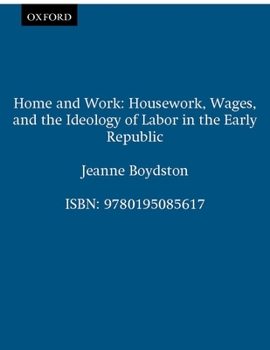Home and Work: Housework, Wages, and the Ideology of Labor in the Early Republic
Select Format
Select Condition 
Book Overview
Over the course of a two hundred year period, women's domestic labor gradually lost its footing as a recognized aspect of economic life in America. The image of the colonial "goodwife," valued for her contribution to household prosperity, had been replaced by the image of a "dependent" and a "non-producer." This book is a history of housework in the United States prior to the Civil War. More particularly, it is a history of women's unpaid domestic...
Format:Paperback
Language:English
ISBN:0195085612
ISBN13:9780195085617
Release Date:January 1994
Publisher:Oxford University Press
Length:248 Pages
Weight:0.73 lbs.
Dimensions:0.8" x 5.5" x 8.2"
Related Subjects
19th Century Business Business & Finance Business & Investing Economic History Economics Gay & Lesbian History Humanities Labor & Industrial Relations Language Arts Linguistics Political Science Politics & Government Politics & Social Sciences Revolution & Founding Social Sciences Unemployment Women in History Words, Language & GrammarCustomer Reviews
2 ratings
The Pastoralization of Housework
Published by Thriftbooks.com User , 18 years ago
I have to modify significantly the previous reviewer's take on this book. Boydston does not argue that women did all the work while men got all the pay. What she argues is that because women did as much unpaid work as they did, factories benefited more from male labor than they might have if they'd considered and economically rewarded the female labor that went into making the male a productive worker. In other words, capitalists effectively got two for the price of one when they hired a male worker. Without a female working for free at home while practicing home economics to keep expenses low, the American labor-profit system in the early republic would have been unsustainable. To make this system palatable, Boydston argues in her concluding chapter (indeed, the chapter that really is the point of the book), the culture generated a pastoral mystique of housework . . . images and ways of talking about housework that made it seem not only natural, but part of the beauty and splendor of nature. The previous reviewer's take suggests that this book in some way could be read as perpetuating a simplistic male/female gender war mentality. Instead, where this book really leads is to a common enemy of the mass of men and women: an exploitative political economy that thrives on the poverty of the family. Women entering the marketplace has done little to solve the problem. Indeed, what Boydston shows is that women have always been in the marketplace. If you think about it after reading this book, it becomes pretty clear that in the postmodern, post industrial age, capital is still getting two workers for the price of one: women working for less pay than men and men working for less pay than they have before. Meanwhile, the economy absorbs the on average lower female wage in a network of childcare services (daycare, formula, etc.) and "busy lifestyle" services (convenience food, maid services, etc.) that leave the situation little changed. Meanwhile, of course, the marketing machine continues working overtime to naturalize this situation.
The labors of a housewife -- now and then
Published by Thriftbooks.com User , 24 years ago
Boydson goes to prove that the average woman ha had to work long and hard hours that have been often under paid and overworked while the men get their payment, the women must endure long hours and work extra hard. This book seeks to tell how the women have built the economy and have been one of the major leaders yet do not get the credit that they deserve. Think about the long hours put in spinning, canning, and doing the house work without air conditioning and yet still how it is today! This si the book to read for all historians.






